Impact & Accountability
Measuring our impact
Six snapshots of our impact
Across our region, we focus on impact at the intersection of equity, economy, and the environment toward transformative change. Together with a wide network of hundreds of partners–including nonprofits, businesses, tribes, agencies, philanthropic organizations, and individuals–we’re expanding our impact through collective action.
Our process for identifying the best indicators to demonstrate our impact has been ongoing. Read more below about efforts to evolve our measurement practices to include principles of Equitable Evaluation, and more meaningful indicators of equity, justice, resilience, and well-being.
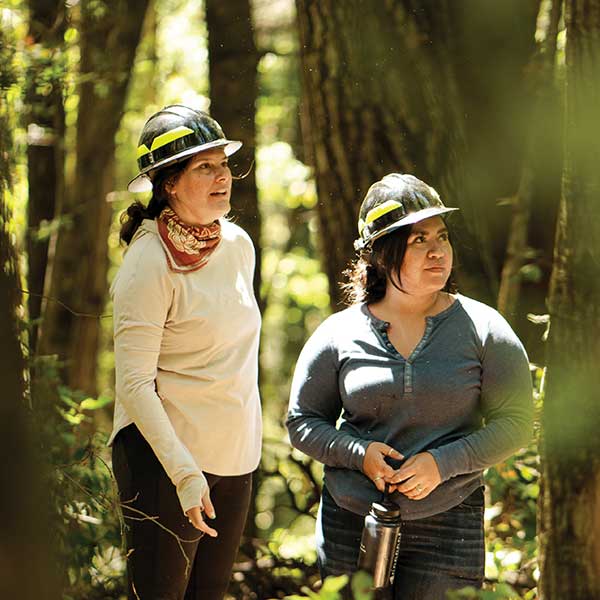
funding and project partners committed to radical, practical change.
Stephanie Gutierrez, Ecotrust Forest and Community Program Director, and Elisha Flores, former forest planner for the Hoopa Valley Tribal Forestry Department, visit a logging site in forestlands managed by Hoopa Valley Tribe. Photo credit: Sean Gutierrez
Our work is only possible due to the support and collaboration of a wide network of partners. Across our work, partnership is at the center of what we do. In 2022, we were joined by:
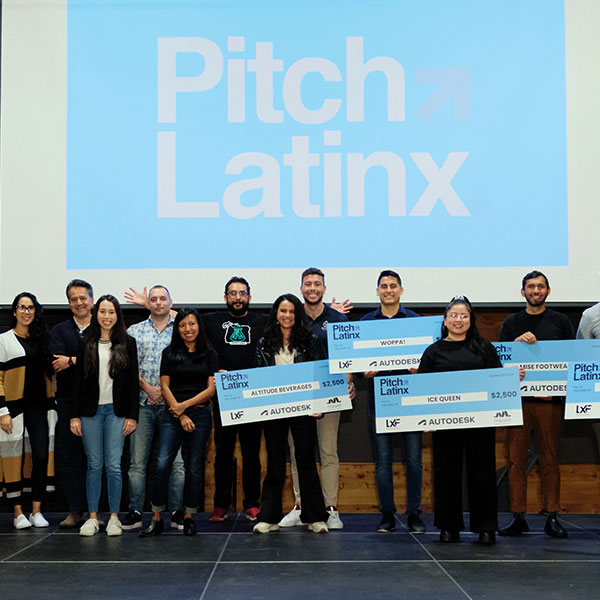
Ecotrust Events Community Grants awarded since our program started in 2014.
Entrepreneurs and event organizers take the
stage at Redd West during Pitch Latinx, a 2022 grant recipient. Photo credit: Juan Barraza
Since 2014, Ecotrust Events has offered event space, free of cost, to nonprofits with limited means and that center communities of color. In 2023, the Community Grant program awarded a total value of $32,000 in event space to the following nonprofits:
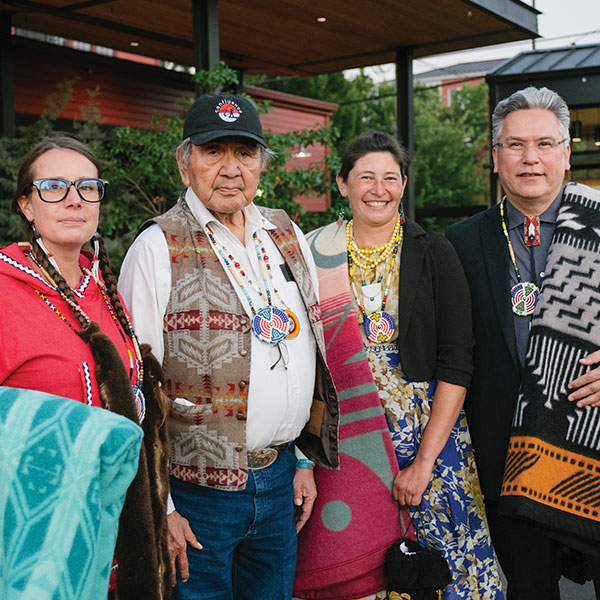
Indigenous Leadership Awards distributed since 2001.
2022 awardees Spring Alaska Schreiner, Michelle Week, and Paul Lumley posed with Antone Minthorn (second from left). Julie Kitka, who was also one of the awardees, participated virtually from Alaska. Photo credit: Kari Rowe
The Indigenous Leadership Awards is a celebration of the determination, wisdom, and continuum of Indigenous leadership across the region. For 15 years, Ecotrust has been proud to honor Indigenous leaders from across the region at in-person celebrations hosted in Portland, and provide them with unrestricted cash awards–many of which are reinvested in their communities.
In October 2023, seven inspiring leaders and the first youth group to be recognized with the award were each granted $12,500 and honored at the Redd on Salmon Street among a gathering of 300+ friends, family, colleagues, and supporters in. As a lead up to the Awards we host a series of free, online educational events called the Indigenous Leadership Briefings. More than 1,000 people registered to hear from Indigenous leaders on topics related to the survival and resilience of tribal peoples.
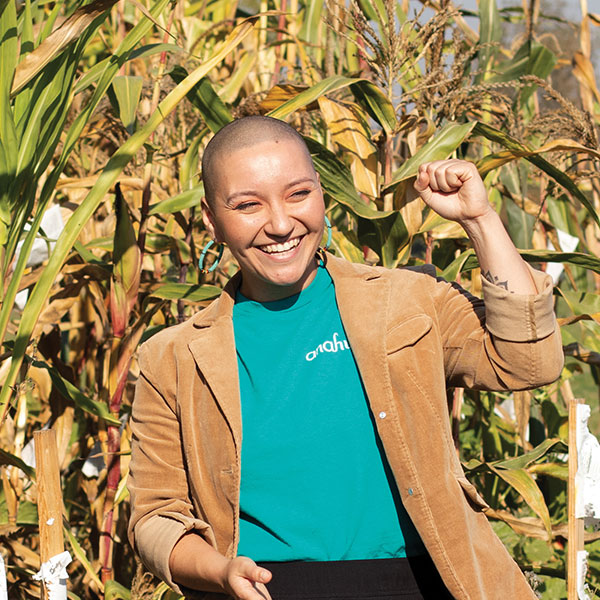
businesses supported yearly from 2019-2021.
Sofia Baum, former Anahuac Capital Campaign Manager. Photo courtesy of CAPACES Leadership Institute
Ecotrust supports businesses in a variety of ways, including short-term space and long-term physical space and storage; temporary physical space for events; technical assistance; software development/IT support; and low-cost capital. This includes our Community Asset Development (CAD) program.
CAD is designed to support the strategic redistribution of resources into community-led projects offering philanthropic prospecting and strategic support to Anahuac Farm—a project of CAPACES Leadership Institute—during a capital campaign that helped the organization purchase 60 acres of organic farmland. In total, CAD team members have supported six community organizations since the program began in 2021.
“
Collaboration (with Ecotrust) has been really insightful, grounding, and joyful!
—Sofia Baum, former Anahuac staff member and Capital Campaign Manager
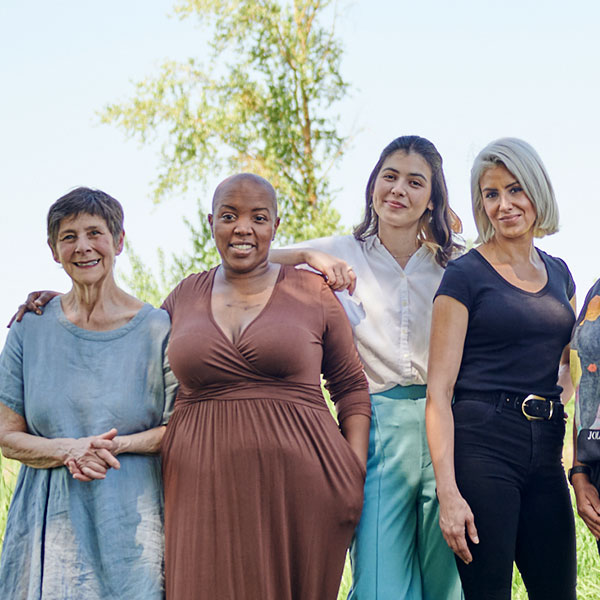
participants each year who completed training, leadership, or business development programs from 2019-2021
Farm to Early Care and Education Advisory Committee members, l to r: Roberta Recken, Alisha Howard, Gabriela Bizari, and Guadalupe Yundt . Photo credit: Jason Hill
Across our teams, supporting the existing and growing leadership of global majority communities is a key priority, clearly defined in our Strategic Plan. Programs that have offered training or professional development include the Viviane Barnett Fellowship for Food System Leaders, Indigenous Forestry Mentorship Program, Farm to Early Care and Education, Southeast Alaska mariculture training, and the Green Workforce Academy. Please check out our current Open Opportunities to get involved.
The Green Workforce Academy is a paid opportunity for Black, Native, and people of color in Portland who want to learn more about jobs in the green economy. This collaborative-led program is produced in partnership with the Blueprint Foundation, Wisdom of the Elders, Native American Youth and Family Center, and Self Enhancement, Inc. To-date the Green Workforce Academy has graduated a total of 78 participants.
“Teresa (Gaddy’s) organizing to make the space for the Green Workforce Academy has changed my life. GWA was one of the first professional spaces that I felt like I could be my full self—a BIPOC man.”
—Mario, Spring 2022 GWA graduate

grant dollars awarded to Ecotrust for collaborative projects focused on equitable, climate-smart land and water stewardship since 2019
Photo credit: Sean Gutierrez
Together with funding and project partners, we are working to make a collective impact toward equitable, climate-smart management across this region’s forests, farmlands, and waterways.
In 2021, with the support of these collaborative funds, our team published definitive findings that show ecological management leads to increased carbon storage. This information is critical for architects and builders who are looking for ways to decrease the carbon footprint of their projects.
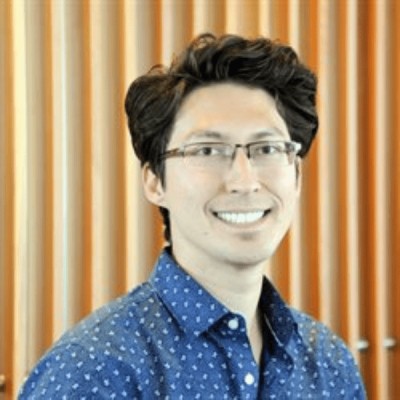
“
Ecotrust’s work around linking the carbon dynamics of the forest with wood product procurement has been invaluable to the architectural design community.
—Jacob Dunn & Christian Schoewe, ZGF Architects
Measuring equitable outcomes
In order to better quantify and track impact across our various programs and projects, in 2019 we developed a set of key indicators to measure various outcomes and chart our shared progress towards our vision and goals. We have also committed to apply a set of Equitable Evaluation principles in measuring outcomes. This includes using an equity framework for all new evaluation projects, as well as inviting input from affected parties throughout various stages of an evaluation, from design to meaning-making. Learn more in our Equitable Evaluation at Ecotrust report brief.
Our goal is to more faithfully reflect our and our partners’ progress toward the world we seek to co-create and inhabit, and to share this information with our community with clarity and specificity.
In 2017, we published our first Equity Progress Report. We are committed to centering racial equity in our partnerships and projects, and within our organization. This ongoing work is described in detail at Equity at Ecotrust.
In 2020 and 2021, we released Indicators Reports that measured organization-wide outputs according to seven indicators: Acres, Audiences, Businesses, Inclusion, Jobs, Partners, and Trainees.
With the implementation of the 2022-2026 Strategic Plan, the indicators for our work are shifting and a new framework is in development.
Bringing together evaluation metrics around programmatic performance and progress toward building a more equitable organization, we continue to share stories of impact in our Annual Report. Read our latest Annual Report.